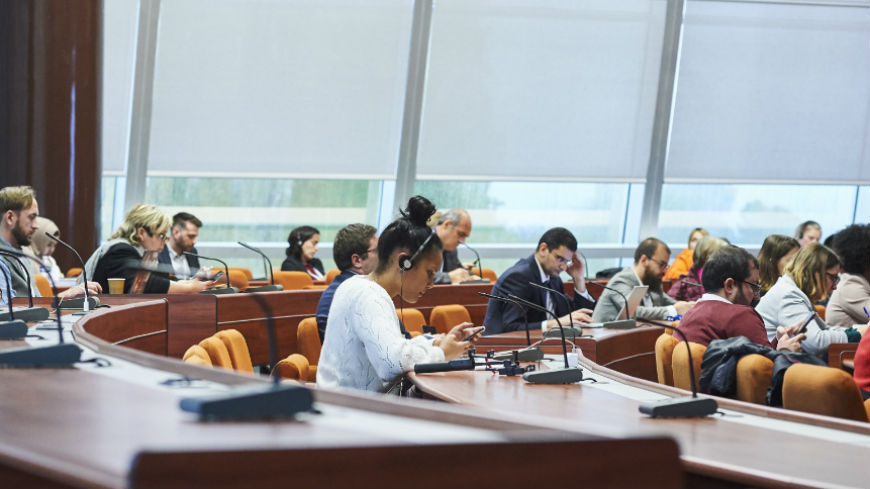Under the joint sponsorship of the Council of Europe Congress and the Grand-Est Region (France), LAB 2 of the World Forum for Democracy on “Rebuilding trust in institutions”, held at the Council of Europe on 7 November 2019, considered a series of initiatives to inform citizens and involve them in scrutinising public policy. Digital tools can facilitate transparency but there is no obligation here, hence the importance of political, human and educational engagement on behalf of elected representatives and civil society.
Transparency clearly is one of the fundamental principles of good governance on which public trust in authorities depends. But how can it be achieved? In the view of Marci Harris, CEO of the Popvox civic engagement platform in the United States, “democracy is above all an information system”. Citizens and elected representatives have to share common knowledge so as to better deal with contested knowledge. She explained how her platform, Popvox, had allowed co-operation between members of the US Congress, associations and citizens. They had been able to work together on the key points of a bill on environmental justice which had just been published. The next phase, Popvox Local, will be tested in several pilot jurisdictions over the course of the year, again with the aim of encouraging citizens to take part in drawing up policies that concern them directly.
The work in the LAB showed the participants that, in spite of the differences between their economic and social systems, with varying degrees of development and prosperity, all countries worldwide are facing similar challenges in the area of democracy, which means it is important to share ideas and learn from one another’s experiences. The “Follow the Money” initiative in Nigeria highlighted the fact that “speaking with one voice” enables the public to hold the authorities to account for money spent and speed up social change in the area of education, infrastructure and health. This participatory project, which was started in 2012 in a country with great social and health challenges, has used digital technology to mobilise a network of 5 000 activists. Presented by Ms Kevwe Oghide, Communications Lead at Connected Development, the initiative also involves holding meetings between village chiefs, representatives of government institutions and marginalised groups such as women and young people. The initiative clearly attracted the interest of the participants in the Forum as a whole, going on to win the 2019 Democracy Innovation Award.
The need to harness not only digital technology but also human potential was stressed by several participants in the LAB and, in particular, during the statement by Marjatta Peltonen, Project Officer with the City of Helsinki: “We are faced with the challenge of being able to reply to citizens’ messages on the city’s interactive platform. To ensure trust, they need to be dealt with by human beings, not robots.” She said that automatic analysis of messages can therefore help but it cannot exempt from the need to train public servants in the use of these technological tools to enable them to engage directly with citizens.
In his contribution to the LAB, Marc Cools (Belgium, SOC/G/PD), member of the Congress of Local and Regional Authorities, stressed the need to teach critical thinking and the ability to use technology among future citizens from school age. Helping them understand their rights under the existing political system is vital to ensure their participation. “While two-way communication on digital platforms is clearly important, what can be done to make sure that authorities do not use it for purposes of hidden political propaganda?” he asked. In his view, there is an urgent need for citizens to take up tools for overseeing transparency as of now, in order to avoid the risk of European democracies descending into authoritarian excesses.
Serbian investigative journalist Jelena Radivojevic, who set up the KRIK website with several colleagues, pointed out that, in her country, the problem of corruption is combined with authoritarian attempts to silence critical journalists. She believes that providing the public with information concerning the income, assets and career of government representatives, mayors and candidates for election in Serbia has restored the hope of many Serbians in real democratic change. With its 30 000 followers, the blog of Serbian judge Miodrag Majić has also been a public success in spite of political pressure. At the LAB, the judge underlined the importance of joining forces with civil society, while nevertheless bearing in mind that a growing number of NGOs are being set up and used as tools by government bodies.
During the discussions, several statements by Serbian and Bulgarian activists called for stronger action by EU institutions, which they believed were not doing enough to combat corruption of the judicial system in the two countries, one of which is already a member of the EU while the other is moving towards accession.
In conclusion, the LAB moderator, Ms Selin Sayek Böke, member of the Parliamentary Assembly of the Council of Europe (Turkey), asked three questions which she believed were vital to the future of democracy: should we build or rebuild our institutions? What methods should be used to transform the current system? Digital platforms, yes, but working for customers or for citizens?
See also:




